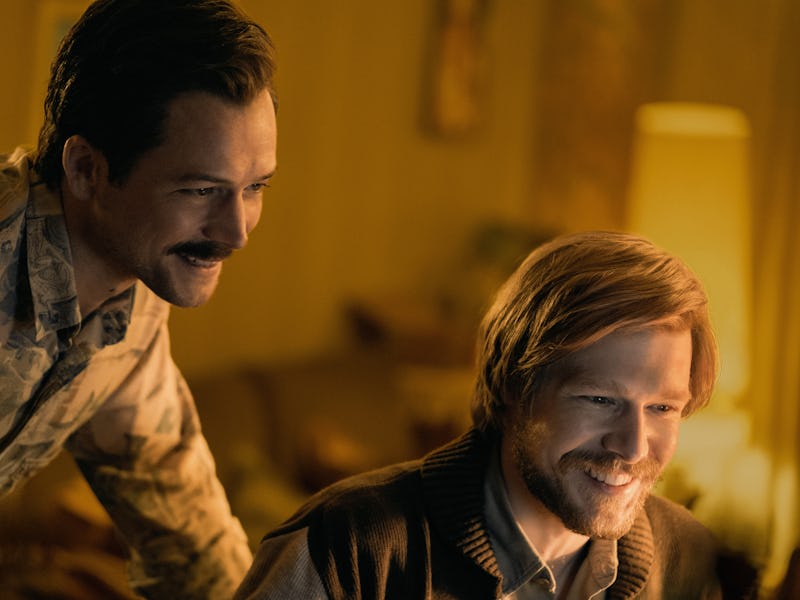Tetris Turns a Video Game Biopic Into a Nail-Biting Thriller
When the war over Tetris becomes a Cold War movie.

I remember it like it was yesterday, the first time I slotted my Tetris cartridge into my transparent, neon green Game Boy Pocket. It was 2000, and I was 8 years old. I watched as the quadrant blocks fell from the top of the screen, waiting to be slotted just so into their geometric brethren below. It was addicting.
Naturally, nostalgia guided me into the path of Tetris, director John S. Baird’s fourth film that chronicles the rise of an iconic game beloved the world over. For those of us who have a soft spot for the 8-bit gem, Tetris is a welcome homage to the story we may not have ever known about a game we have the fondest memories of.
Screenwriter Noah Pink’s film follows Henk Rogers, a Dutch-American video game designer and entrepreneur who discovers the enigmatic and addictive Tetris at a game conference. From there, he becomes dead set on securing the rights for video game consoles, maybe even arcade rights as well — but what he doesn’t realize is that means he will have to volley for a business deal with Gorbechov’s Russian government from inside Moscow amid the Cold War.
Nikita Yefremov’s Alexey Pajitnov is the creator of Tetris, which becomes the center of an espionage scheme.
Unexpectedly, the film lands pretty firmly in thriller territory, which turns a typical biopic into an entertaining nailbiter. Obviously, we know the game makes it out of Russia and into consoles across the world, so we’re comfortable going on the ride knowing the outcome — but that doesn’t make the ride any less fun. The stakes are high and the consequences are real. It feels as much like an intense political drama as it does a creation myth or a story of fierce determination in the face of innovation. Even when you think the nearly two-hour film might start to feel like a bit of a drag, Baird fires things up and ignites your investment yet again.
A film about Tetris wouldn’t be complete without some visual homages to the game itself, and thankfully, this film takes that seriously. The movie is littered with absolutely lovely 8-bit reimaginings of the film’s characters, settings, and even marks the film’s four acts with “level” screens. The choice, one that is visually appealing and nostalgia-driven, is so smart that it nearly bowled me over. Plus, the delightful graphics even come back around at the end of the film in a way that will make you feel so emotionally fulfilled within the confines of the story you won’t be able to help but cheer.
The heart of Tetris, though, is not the game itself but the cast of characters who believe so strongly in its power to universalize the human experience. Taron Egerton shines as Rogers, a determined and scrappy businessman who pushes through even when the chips are down. Even though the ball isn’t always in his court, he is savvy enough to volley for serve and — as history tells us — he ends up getting it. His emotional arc, especially his journey as a father, is made stronger through his performance, and it’s a joy to watch him give this role his all.
Opposite him is Nikita Yefremov’s Alexey Pajitnov, the strong, silent type who created Tetris in his quaint Moscow apartment before it leaked out to the world beyond the iron curtain. Yefremov’s performance is so contained it’s hard not to wonder at first if his character will ever soften and let the world in — that said, you don’t blame him for keeping his guard up. He is so steadfast in his beliefs and his need to keep his family safe, and his fear of his government is palpable. However, when the audience finally gets to experience the other side of his character’s emotional journey, it’s potentially more gratifying than the journey of the game itself. He’s an actor to watch, and hopefully, we will see him in more international films in the future.
Taron Egerton shines as the businessman who risks it all to make Tetris a worldwide phenomenon.
Pink’s script aids in the likability — or unlikability, on the part of some of the more shady characters in the film — of the main players. But more than that, it shapes the story into something cutthroat and at times even calculated with its quick wit, smart observational dialogue, and the overall cadence it brings to the film in collaboration with Baird’s directorial hand. Rogers’ dialogue is particularly fun, making sure he comes across as both smart and dumb at the same time. Of course, he’s not exactly stupid, but his Russian adversaries always seem to be one step ahead. The script skillfully draws a map for the characters, and in turn the audience, to follow in the quest for the game’s rights, with a smart structure that manages to stay interesting — piece by piece, and with the occasional deadly wrench in the works.
At the halfway point of Tetris, as KGB agents descend on their location, Pajitnov tells Rogers, “Good ideas have no borders.” The line made one think about what the world would’ve been like had Tetris never grown to become an international phenomenon. Something else would’ve undoubtedly taken the throne in its place, but it’s almost certain whatever it would’ve been would not have secured a place in the zeitgeist like Tetris.
Fittingly, Tetris is a fast, fun, and spirited journey to personal fulfillment, the right side of history, and worldwide admiration. It’s the heartfelt and effective film that this story, and the people at its center, deserve.
Tetris premiered March 15 at SXSW, and is scheduled to be released on March 31 on Apple TV+.
This article was originally published on